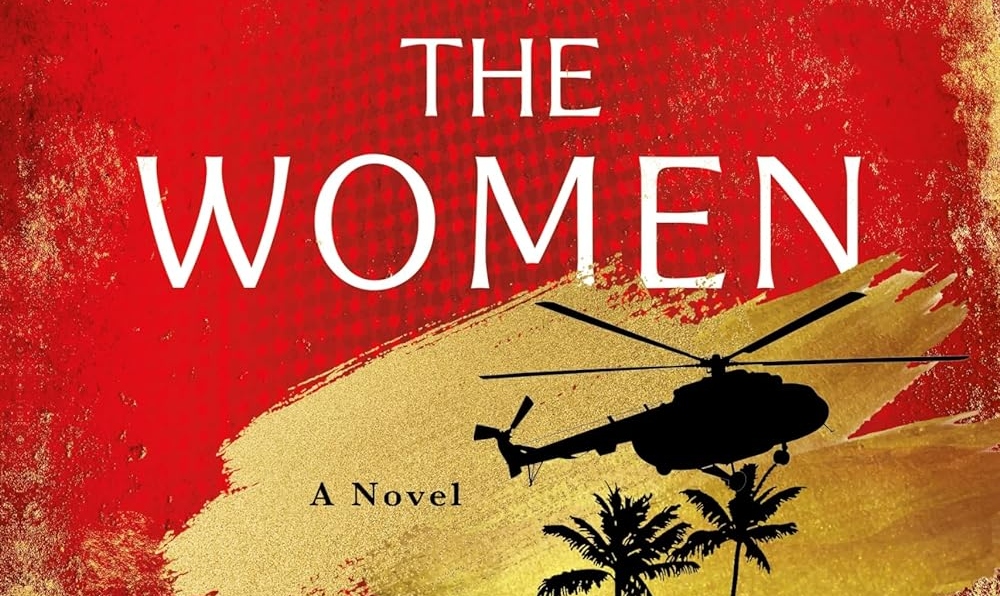The young nurse desperately seeking help from the Veterans Administration was dismissed and told, “There were no women in the Vietnam War.” But despite the VA’s initial blindness, women were there. An estimated 11,000 American women served in the military in Vietnam, 90 percent of them nurses, and eight were killed.

The Women, Kristin Hannah’s latest book, uses a fictional hero, Frankie McGrath, to bring to life the story of those brave nurses who answered their country’s call and served. The sisterhood soldiered through traumatic 18-hour days, tending gut wounds and napalm burns and comforting those who couldn’t be saved.
This book is arguably Hannah’s finest of the more than 20 historical novels she has authored, among them bestsellers like “The Nightingale” and “Firefly Lane.” In her latest work, the reader closely follows a 20-year-old nursing graduate intent on serving her country and following her beloved brother Finley into the Vietnam war. Prior to Frankie’s deployment, two officers arrive to give the family devasting news: Ensign Finley McGrath has been killed in action. There were no remains.
Assured by Finley’s friend Rye that “women can be heroes,” Frankie joins the Army Nurse Corps and arrives as green as many young men who were being sent off to fight. She is tutored by two experienced nurses, Barb and Ethel, bunkmates destined to become her lifelong friends. The first half of the book is an emotional journey for Frankie, a coming-of-age story filled with hope and discovery.
On Frankie’s first night, Ethel leads her by the hand to the staging area saying, “This is triage. We assess here. We decide who gets seen and when. We treat the ones we can save first. That screen over there in back? We put the expectants there – men who probably aren’t going to make it.”
Assigned to serve in the OP, Frankie is challenged by a battle-scarred surgeon who steps away from the operating table leaving the neophyte for the first time to close a wound. He tells her, “Damn it, McGrath we don’t have time for fear. You’re good enough.”
During infrequent times when the rush slowed, the three nurses boarded a helicopter for MEDCAP (Medical Civic Action Program) trips into the countryside to provide medical care to locals. They found wounded orphans, napalm injuries, bombed villages. Why were there no stories in Stars and Stripes? Why weren’t they reporting the truth? Some of the bombed villages were in South Vietnam and only Americans had bombs.
After three years serving ever nearer to the action, Frankie returns home to parents who have been unable to admit that their daughter has been serving. They lied by saying she was studying in Florence. Frankie comes back to discover a nation bitterly divided over the war. In her search to find her postwar place, she becomes increasingly conflicted and erratic.
Only with her nurse friends does she find comfort; even her own father is ashamed of her. Frankie stands with her friend Barb marching with a crowd of veterans against the wars. She loses a job, wrecks a car, and drowns her discomfort in booze and pills. Frankie’s journey through resolve, misplaced trust, and divided worlds is told vividly, sometimes evoking unbidden tears.
The author has done a masterful job of illuminating the Vietnam era: the music, the late ‘60s attitudes, the clothing and hairstyles, the changing moral culture, the politics and protests. She takes us into Frankie’s mindset, traveling from the nice Catholic-educated girl to the increasingly conflicted survivor. If one can find any fault, it’s that some lesser characters are not fully portrayed.
Hannah first entertained the idea of writing a novel about the Vietnam War in 1997, but at the time felt she lacked the skill and maturity to achieve her vision. She became more inspired after attending the 30th anniversary of the Vietnam Women’s War Memorial. She met and talked to the remarkable women veterans and heard their first-hand accounts. Hannah notes that her book “would not have been possible” if not for the help, guidance and support of Capt. Diane Carlson Evans, who served in Vietnam, founded the Women’s Memorial Foundation, and wrote her own story, “Healing Wounds.” (In her acknowledgements, Hannah credits Evans’ book as well half a dozen other first-hand accounts and histories.)
In February, 1,600 people showed up at Seattle’s Benaroya Hall for a book launch for The Women. Location of the event was no fluke: Kristin Hannah is a Bainbridge Island resident who graduated from the University of Washington before obtaining a law degree from the University of Puget Sound. During Hannah’s third year at UPS, she and her mother, then terminally ill with breast cancer, passed the time writing notes for an historical romance. That never-completed attempt spurred Hannah when she was forced into bed rest during pregnancy. Her first novel, “A Handful of Heaven,” was published when her only child turned two.
Today Hannah still writes her books longhand on yellow legal pads, often while overlooking the water. She dedicates The Women, written during the Covid pandemic, to the courageous women who served in Vietnam, most of them nurses who had been raised on family stories of World War II heroism. Those women went to war but came home to a country that didn’t care about their service. Hannah further dedicates the novel to POW/MIA veterans and their families who sacrificed so much, as well as to the medical personnel who fought the recent pandemic and devoted so much to help others.
Hannah has given readers a powerful and deeply moving book, a tour de force that’s incapable of being put down once opened. Much less forgotten.
Discover more from Post Alley
Subscribe to get the latest posts sent to your email.
